The importance of empathy today is extraordinary. And if we applied it in our company, what would happen? Here exlplained the importance of emphaty in the customer care.
Brief excursus on what emphaty represents today
The key word in this article is empathy. Word that today we can read and hear from many pens and mouths. Like sustainability, responsibility, resilience, awareness etc. The emotional impact that the word arouses is already captivating in itself. And although it is used for marketing and visibility purposes, we cannot fail to recognize its importance that it holds. In fact, empathy can be summarized as follows: ” it is the ability to put oneself in someone else’s ” shoes ”, to listen and understand and see their point of view ”. It is therefore a question of ” connecting on an emotional level ” . Only this definition makes us understand the positive implications that can be had in our daily interactions with anyone. The consequences of empathic interactions are respect for the opinions of others and respect for the person as an individual and for their dignity.
Customer survey
In this article, edited by MyCustomer and Genesys through the statistical study conducted by Smart Survey, you can see the positive implication of incorporating empathy into company production processes, here in particular in costumer care.
This research analyzed surveys conducted on 504 interviewees after having an experience with customer service. These were the questions asked.
-
Which channel was used and why?
40% used the telephone, 15% the live chat. And the remainder with web form, Chat bot, Email, Social media, Video chat, Messaging App. The most important reasons were: convenience (40%), the strength of habit (22%), the complexity and sensitivity of the query (19%). Then moving on to the recommendation (8%) and then wanting to talk to a human being (6%).

-
How important is empathy for customer service?
Almost all of the respondents stated the importance of empathy during interactions with customer service. 70% said that empathy is really important. 27% that it is quite important and 3% that it is not important at all.
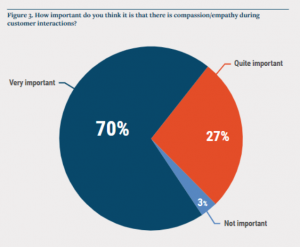
-
How well are customers’ emotions understood?
40% said their emotional state was not understood or not well (27%) or not at all (13%). However, 40% said they believe their emotions have been understood and 20% have reported feeling very well understood. A question that arises spontaneously from these data is whether the channel used for the interaction influences the levels of emotional understanding provided. And the big surprise is that live agents don’t score significantly better for emotional understanding and recognition than other channels, even automated channels.
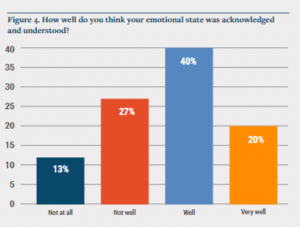
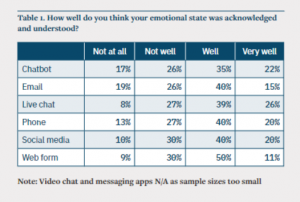
-
How satisfied are the respondents and what were the implications?
We can infer that there is a clear correlation between being satisfied with the overall experience and having been understood and recognized on an emotional level. Furthermore, those who claimed to be understood were more likely to think positively about the brand than those who did not perceive that they were understood. In addition, those who shared their experience with others increased in percentage when they had no understanding or recognition of their emotions – demonstrating that dissatisfied customers are more likely to share their experiences.
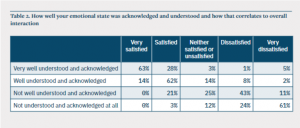
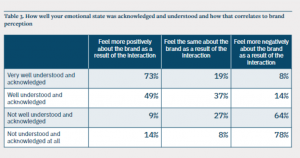
There is also another stronger correlation between query satisfaction and resolution. It can therefore be concluded that resolution is the most important component of a satisfying experience. But empathy is also influential. How much? The results are incredible. Those who did not solve their question but had an interaction that understood and recognized their emotions very well were much more likely to be satisfied than those who had solved their question but had an experience in which they felt that their emotions were not understood or recognized at all. And similar proportions of these two groups are also more positively and negatively towards the brand as a result of those interactions.
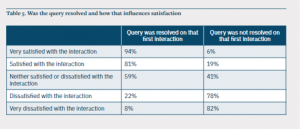
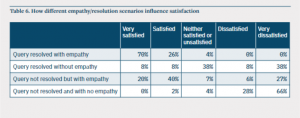
Is it correct the yardstick?
We can deduce that customer satisfaction is not established only by solving the problem but is nourished by the deep (empathic) interaction between agent and customer. It is a fact that it would be hard to believe, as long as the purpose of the interaction was to solve the problem and the conversation to be neutral, anonymous, formal, a convention. I don’t know if it is fair for the customer to claim that they are more satisfied when the query is empathized and resolved than just with the query resolution. Since the main objective of the call was the resolution and not to be ” understood ”.
Conversation is an ancillary (in the legal way of saying) and not a primary element. As much as we can contest the choices of preferences of the interviewees, we cannot forget the consumer’s freedom to have their own opinion and the freedom to choose their own ” supplier ”. But we cannot fail to remind him that his choices have an impact on the market and a wrong and non-rational yardstick can create failures (just remember the persistence of dissatisfied customers against the company accused with bad publicity). All this can be extended to a criticism of reviews on online platforms (is it right to publish positive / negative reviews when most of the time they are subjective experiences?).
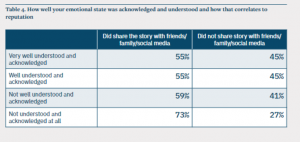
Sometimes we forget that “ responsibility ” falls on all and two actors, customer and supplier. Here we adopt the consequentialist logic: a choice is ethically right if it contemplates the consequences of actions or if a choice has negative consequences, one is ready to modify it. Responsibility education should also be ” taught ” to the consumer and not just demanded by the company.
How can we do more?
But at this point the research results are fact. Empathy has its importance in the custmer care. So if we want our company to be triumphant, we should implement all those strategies to be ” empathetic ” in customer relations. Suffice it to recall, from the research, that ” loyalty leaders increase revenues about 2.5 times faster than their colleagues in the sector ”. This loyalty, as the research recalls, comes from good interaction management.
The article lists various preparatory actions to implement empathy in production processes. Such as:
- ” check if my company promotes empathy between customers and employees ”
- ” develop the organization’s empathic musculature ”
- ” give a precise definition of empathy ”
- ” evaluate current performance ”
- ” better support service agents ”
- ” create empathy in your digital channels ”
Other possibilities of action for a company could be for the face-to-face service with the customer. It needs ensuring that at the time of the selection the HR department selects workers who have a strong emotional intelligence. Even if it seems discriminating, we cannot forget that this soft skill is a crucial requirement for customer care. In addition, to train workers lacking in this aspect, invite them to participate in ” non-violent or empathic communication ” courses designed for the first time by psychologist Marshall Rosenberg.
Conclusion
While demonstrating some criticism, the importance of empathy in the customer care, cannot be denied. It is an essential element to be successful, increase brand reputation, increase revenues and therefore profits. Various actions have been listed but the work is still long and many implementation solutions have yet to come up.